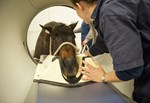Search - All Results
821 - 830 of 1844 results
-
The cat’s out the bag: the most common diseases in pet cats revealed
Gum and dental disease, obesity, overgrown nails and flea infestation reported by the RVC as the top disorders in cats, with risks varying by age and sex. New research from the Royal Veterinary College (RVC) reveals the most common disorders … -
British bulldog ownership has doubled but breed faces high risk of skin disease and obesity
Findings show that due to breeding trends 12.7% of British bulldogs suffer from ear infections, 8.8% from skin infections and 8.7% from obesity -
RVC revolutionise equine imaging with first specialised CT scan for horses
The UK’s first specialised equine computed tomography (CT) scanner has been unveiled at the RVC -
World first, RVC finds cognitive impairments in dogs with epilepsy
A series of pioneering research studies from the Royal Veterinary College (RVC) into dogs with epilepsy have revealed that: Dogs with epilepsy find it harder to obey commands, are slower to learn new tricks, have spatial memory deficits and are easily distracted. Aversive training methods, such as bark-activated collars, prong collars and verbal punishment are associated with poor trainability and their use should be avoided. Some anti-epileptic drugs (the medications commonly used to treat seizures) were found to worsen the cognitive impairment of dogs with epilepsy. Dogs with greater exposure to training activities, including obedience classes, agility, and gun-dog training, were found to be associated with higher trainability and have fewer signs of cognitive dysfunction.You can’t teach epileptic dogs new tricks? A series of pioneering research studies from the Royal …
-
It’s Gold for the RVC as the results of the Teaching Excellence Framework are announced
The RVC has received a Gold award by the Teaching Excellence Framework (TEF) – the highest rating a university can receive! -
Paw-some Donors: Superhero Pets Awarded for Essential Blood Donations
This World Blood Donor Day, the Royal Veterinary College (RVC) is celebrating animals that contribute to its innovative Blood Donor Programme who help save the lives of hundreds of much-loved pets each year. The RVC’s registered charity, the RVC …This World Blood Donor Day, the Royal Veterinary College (RVC) is celebrating animals that …
-
Avoid hot dogs: New legal analysis highlights owners’ duty to protect dogs from over-heating
The Legal Advisory Group on Extreme Conformation in Dogs (LAGECDogs) has released a new analysis highlighting the legal responsibilities of dog owners and carers under the Animal Welfare Act 2006 in England (and devolved equivalents for Wales, …The Legal Advisory Group on Extreme Conformation in Dogs (LAGECDogs) has released a new analysis …
-
International experts warn noisy breathing could signal suffering in popular flat-faced dogs
The International Collaborative on Extreme Conformations in Dogs (ICECDogs) has released new guidance for owners advising that brachycephalic (flat-faced) dogs, such as French Bulldogs, Pugs and English Bulldogs, that have noisy breathing at rest or …The International Collaborative on Extreme Conformations in Dogs (ICECDogs) has released new …
-
Canine health and welfare research funding in the UK: Current status and future opportunities (Complete)
This project, supported by four leading UK canine charities in partnership with the RVC, explored the levels and distribution of UK canine health research funding over the last decade, and analysed the areas of research this has included. Through … -
RVC awarded funding to contribute to the global effort on COVID-19 health research
A project, led by researchers at the Royal Veterinary College (RVC), which seeks to reduce COVID-19 transmission in traditional food markets in Bolivia and Peru, receives fundingA project, led by researchers at the Royal Veterinary College (RVC), which seeks to reduce COVID-19 …










